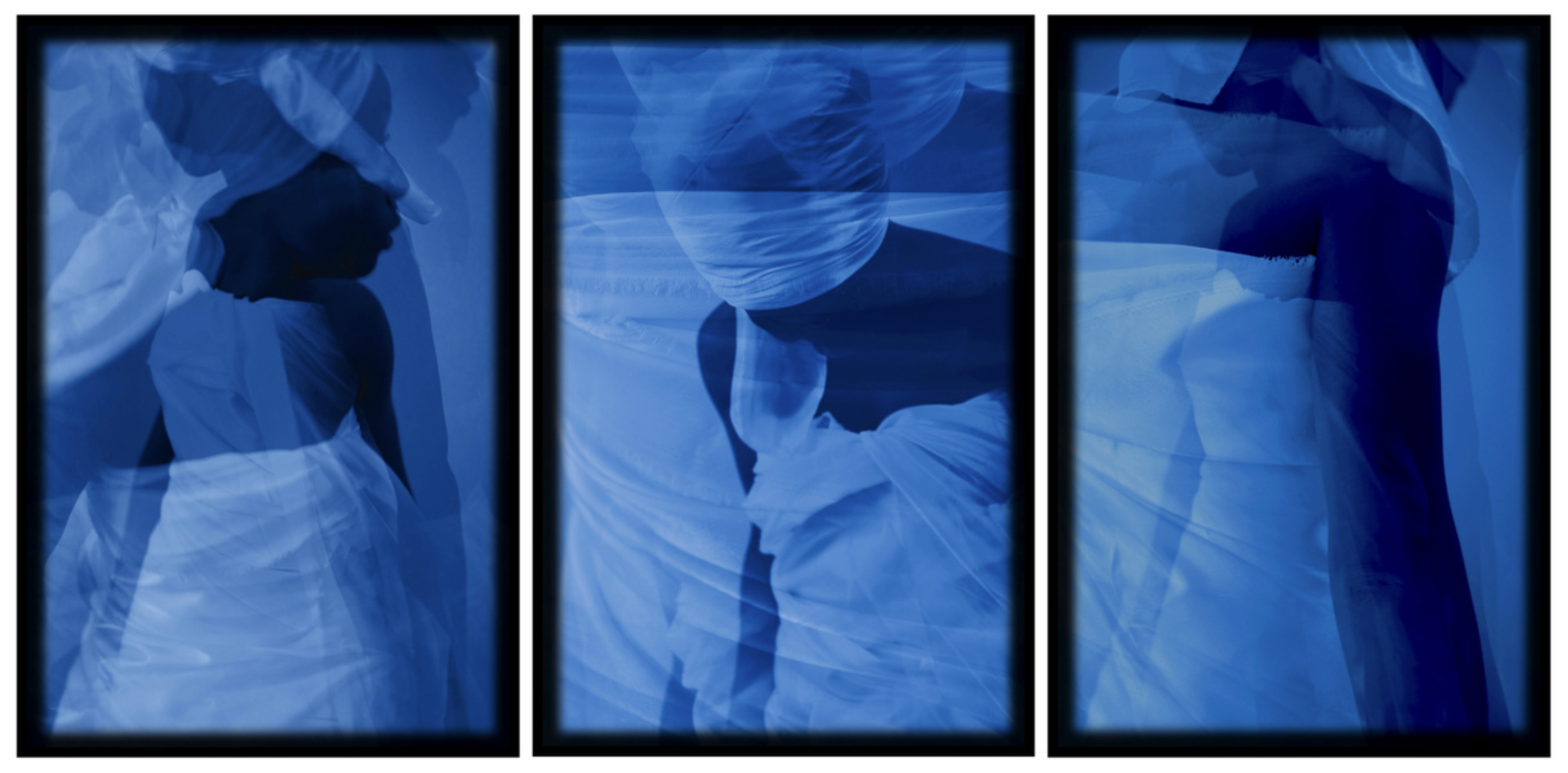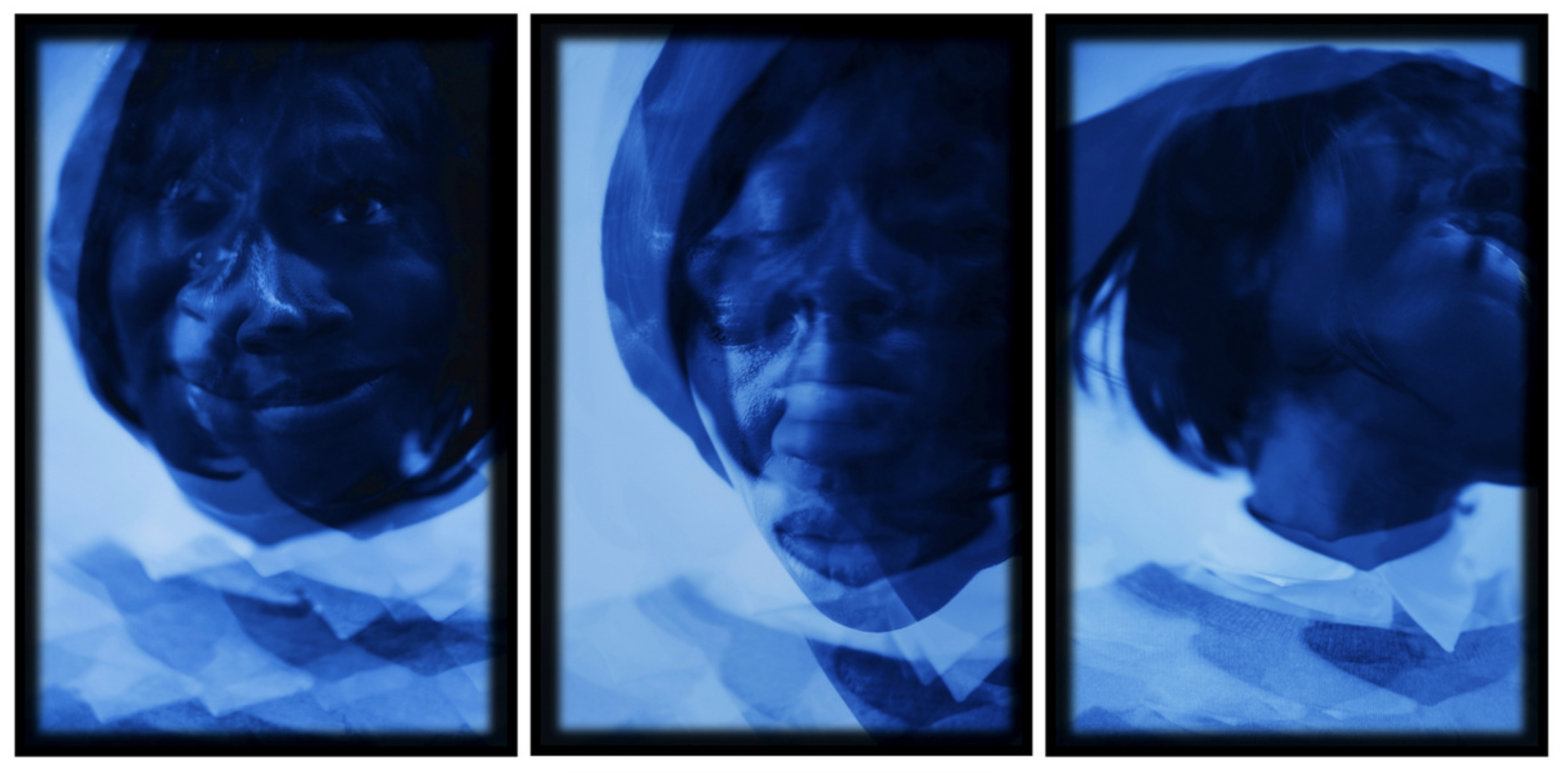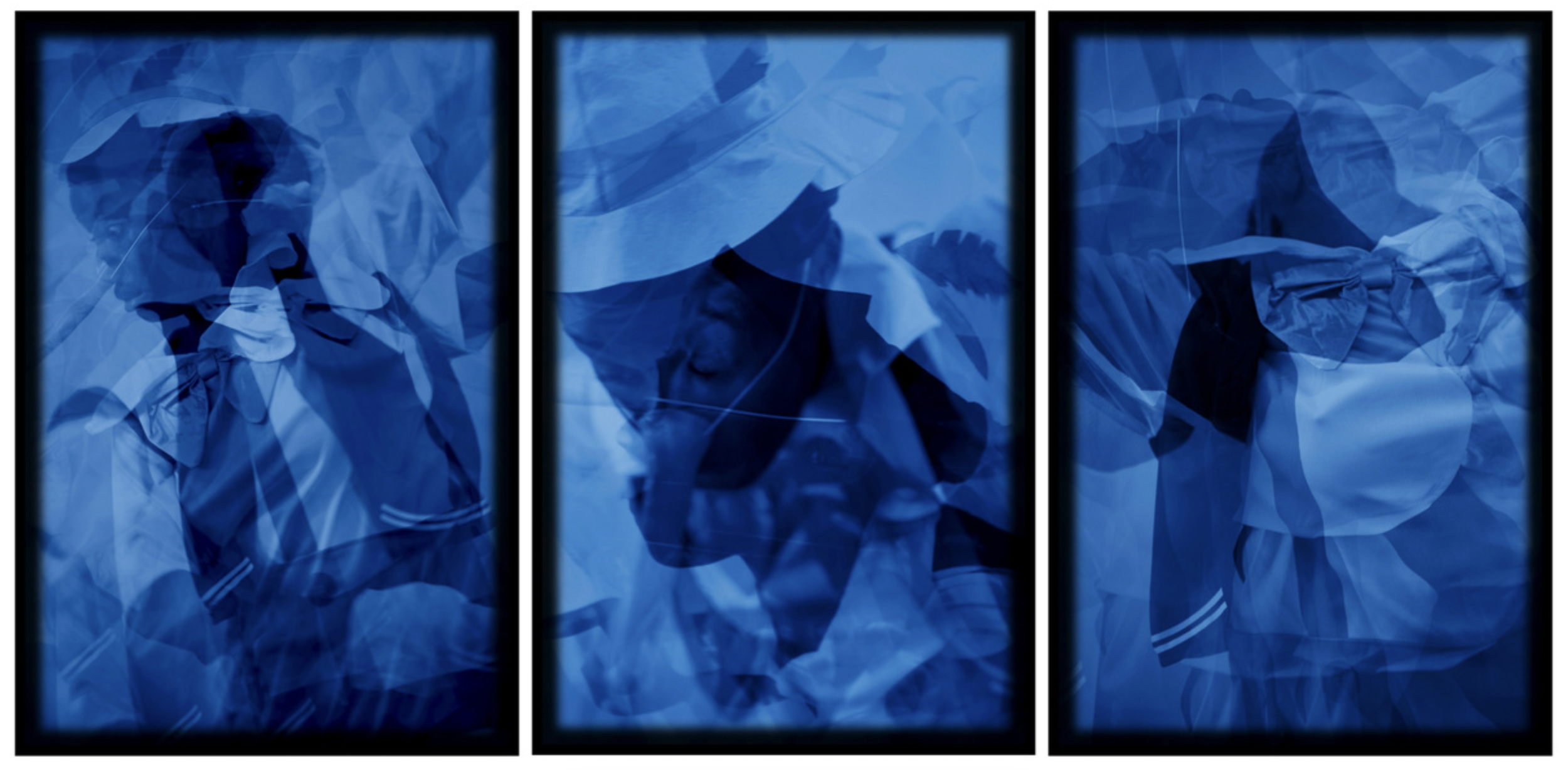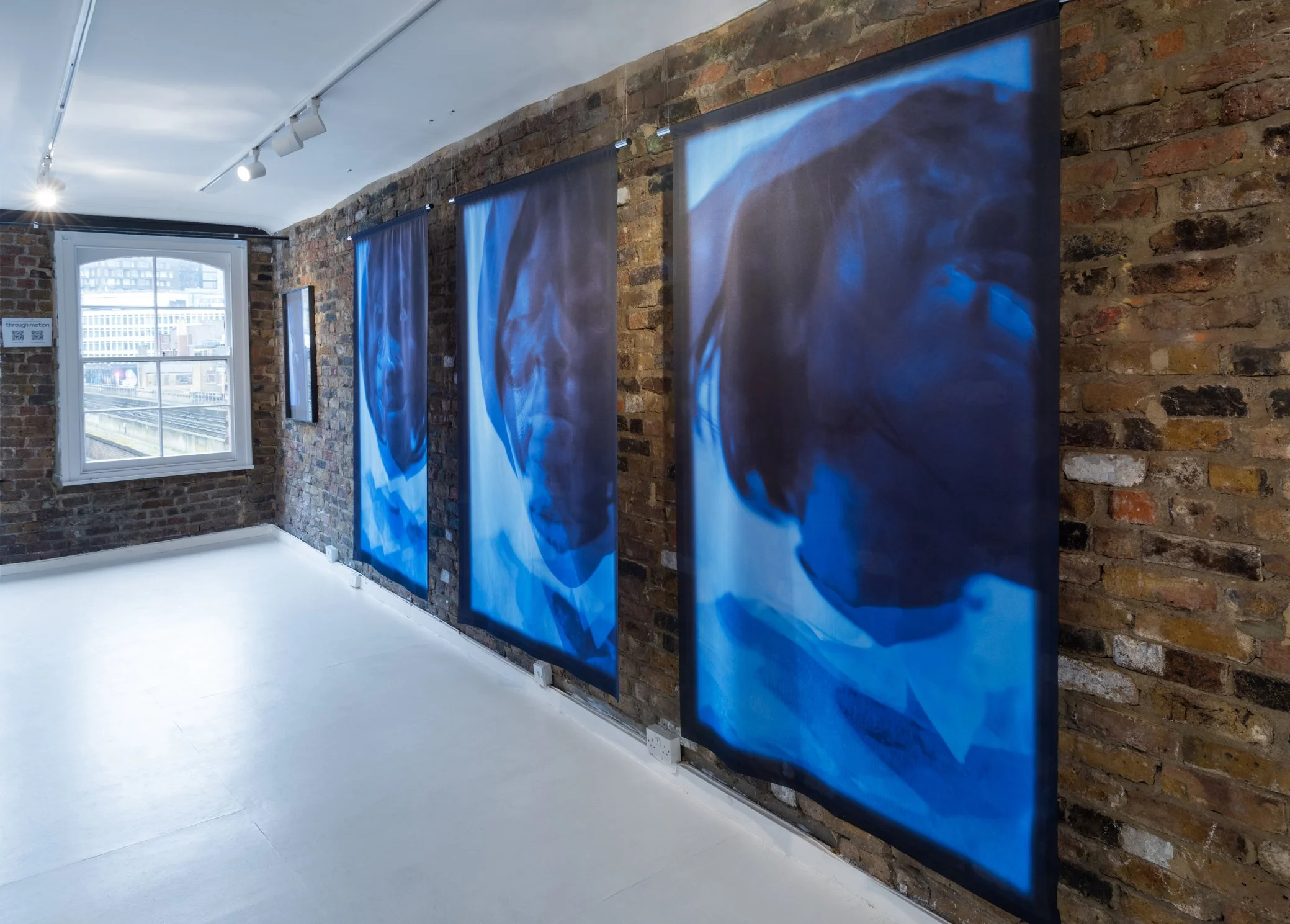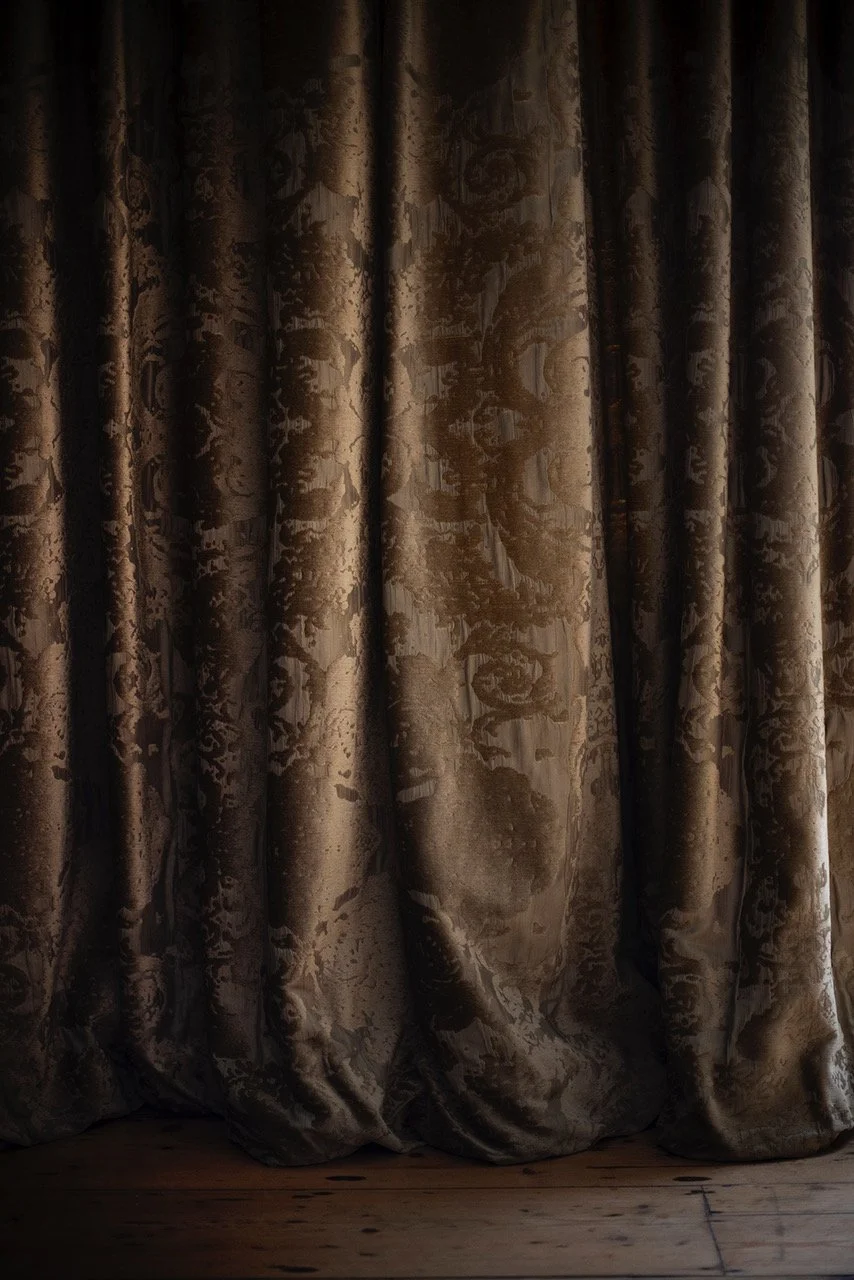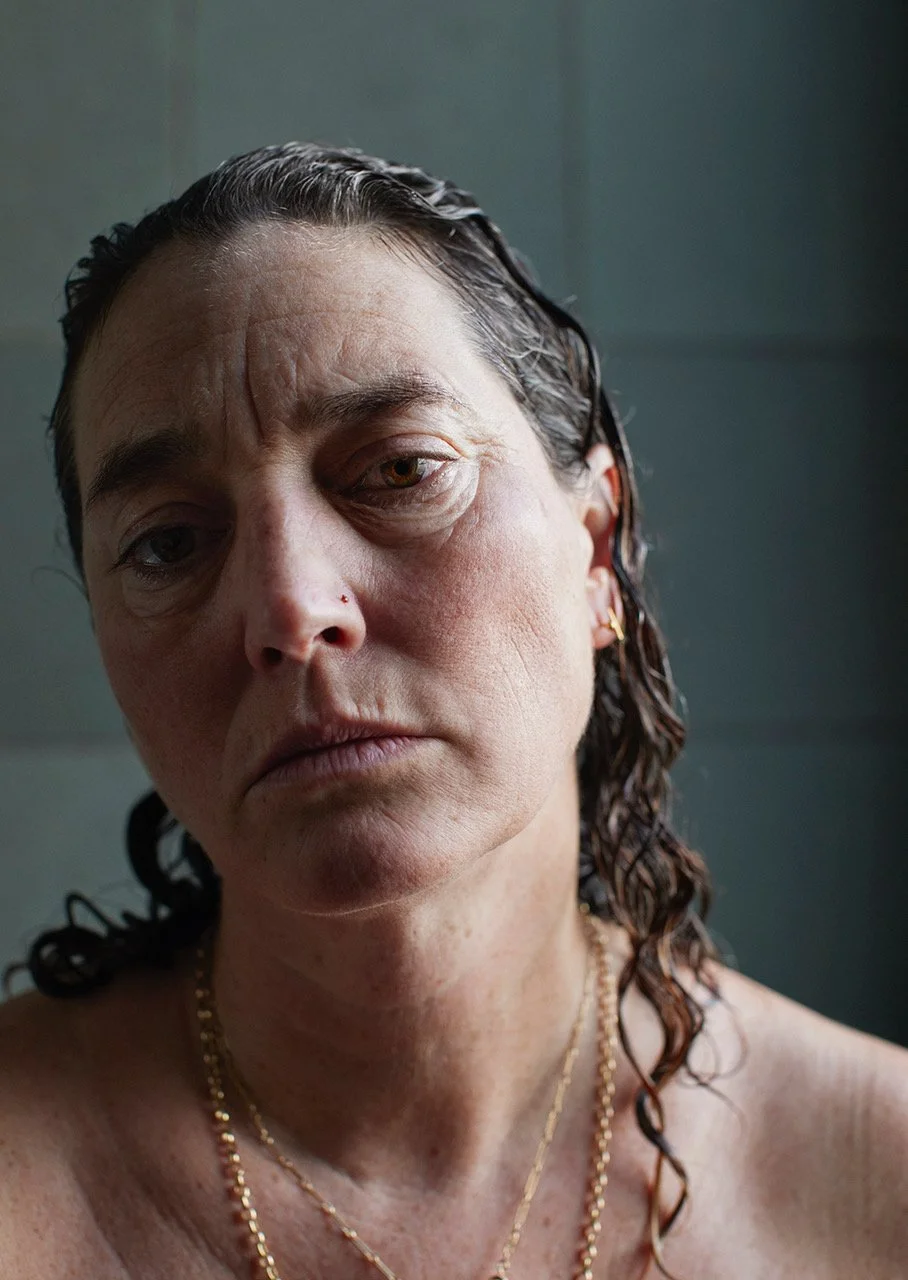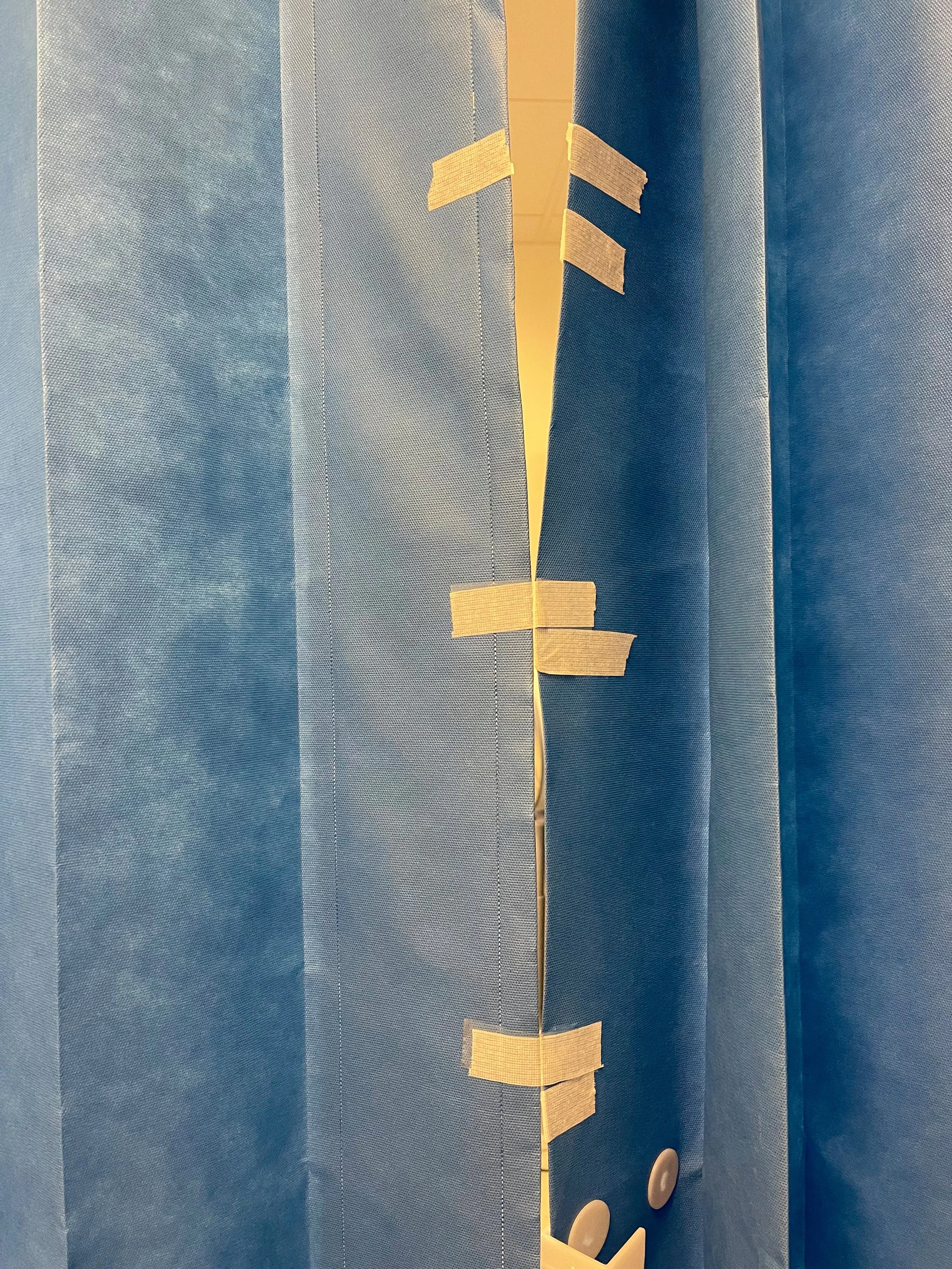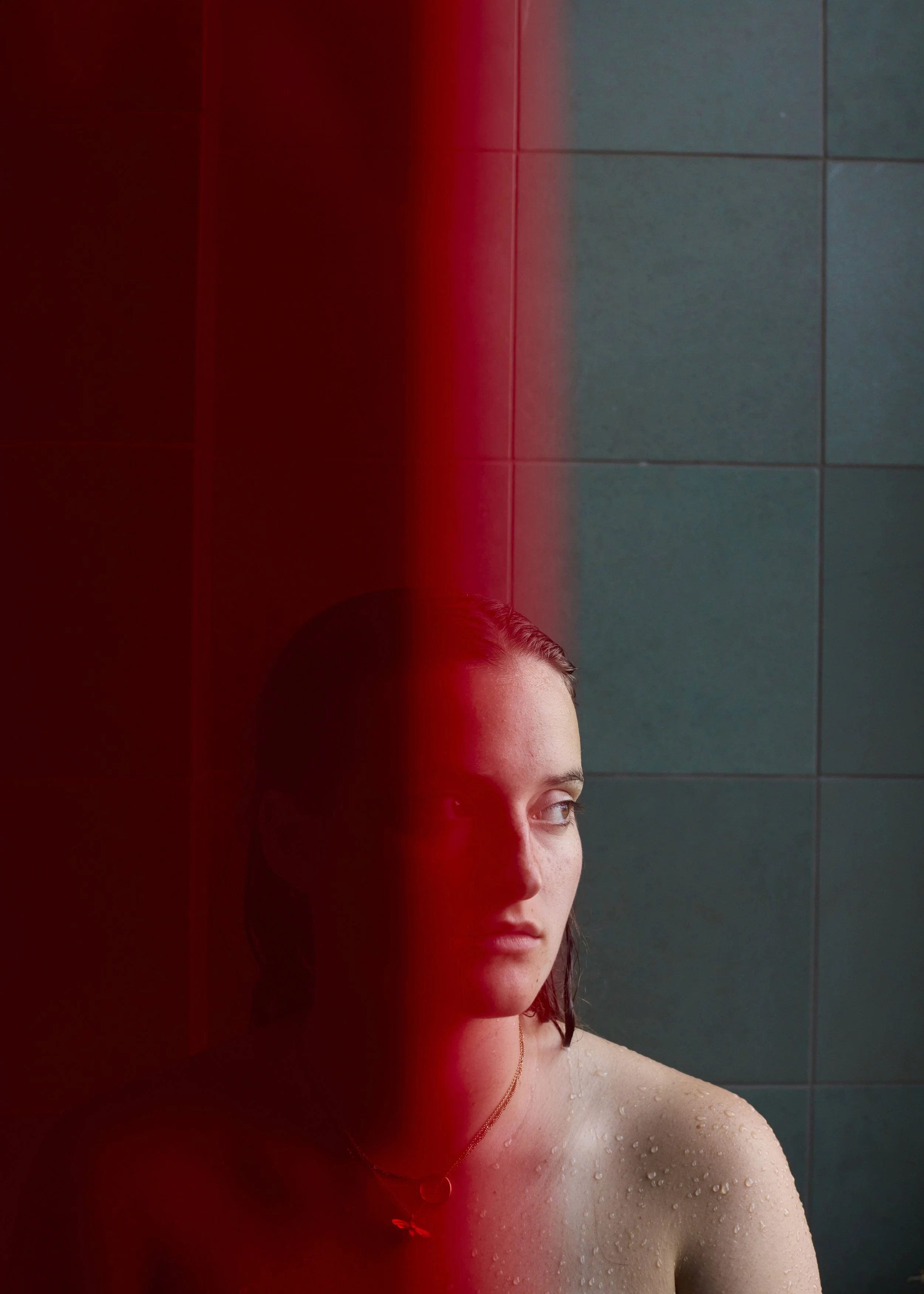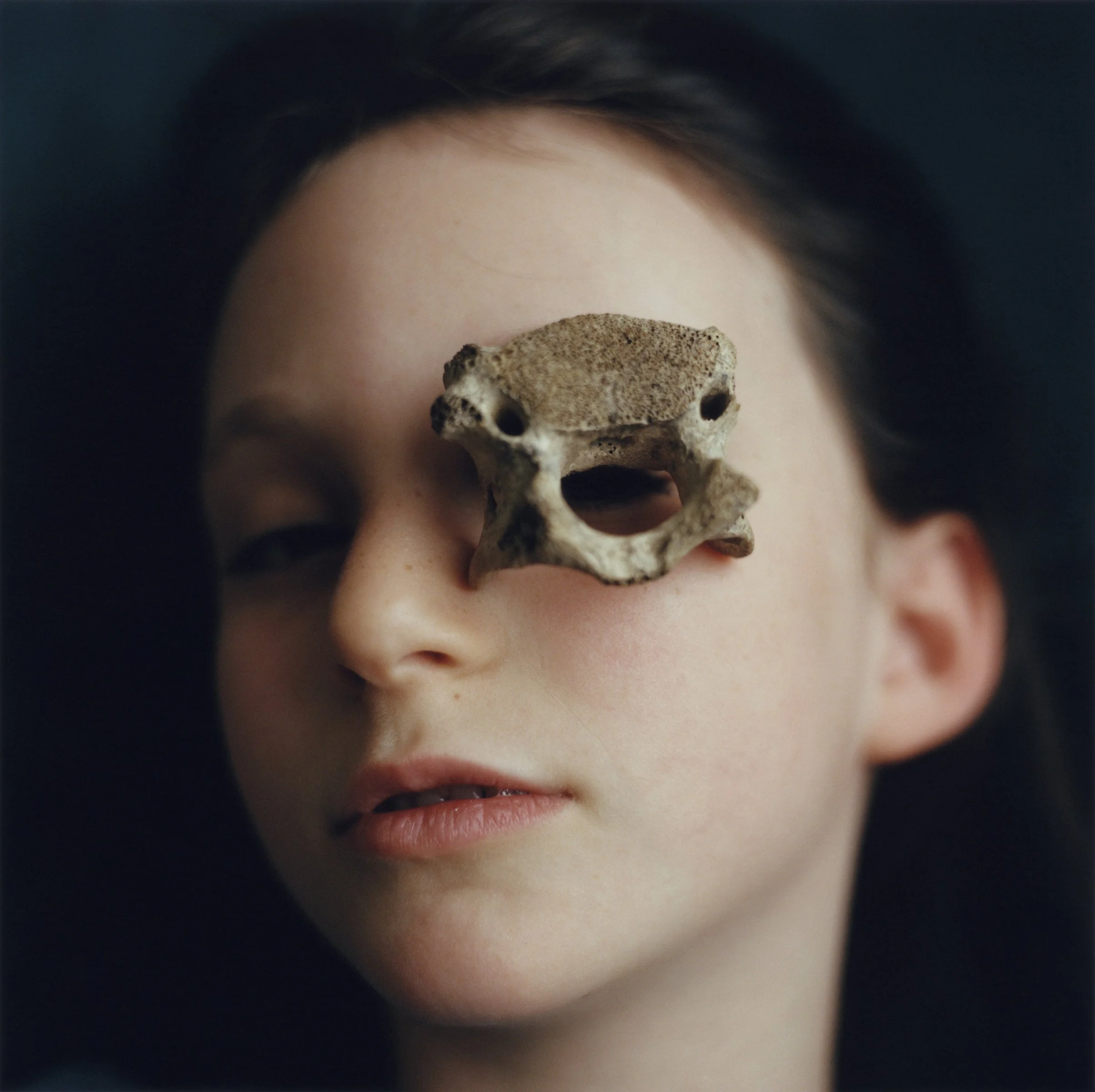Lydia Goldblatt, Bone, from the series Fugue
This exhibition brings together three bodies of work by contemporary women photographers – Heather Agyepong, Jenny Lewis and Lydia Goldblatt – each of whom turns the camera inward to explore the shifting terrain of selfhood, memory and interior life.
Heather Agyepong’s Ego Death draws on Jungian psychology and performative practice to investigate the collapse of fixed identity. Through layered self-portraits and re-enactments, Agyepong challenges the limits of representation, questioning who controls the narrative of self and how transformation might emerge through surrender. Her work oscillates between vulnerability and strength, inviting viewers into a space of unguarded reflection.
Jenny Lewis’s UnBecoming marks a radical departure from her earlier portraiture, turning the lens on herself in order to navigate the paradoxes of middle age, motherhood and autonomy, using the act of self-imaging as both witness and release. Through fractured self-portraits and intimate encounters with her daughter, Lewis explores hereditary time, impermanence, and the longing for reconnection with a body both severed and resistant.
Lydia Goldblatt’s Fugue expands this dialogue with a lyrical meditation on memory and fragility. Combining still images and fragments of family life, Goldblatt creates a visual language that mirrors the disorientation felt during Lockdown and familial illness. These photographs are tender and fractured, evoking the simultaneous presence and absence at the heart of human connection.
Together, these works position photography not as a mirror of the external world but as a medium of introspection: probing the unseen, mapping states of being, and articulating what resists easy visibility. A Mind of One’s Own foregrounds the courage of artists who use the medium to test the boundaries of selfhood, embracing doubt, rupture and renewal as part of what it means to live fully in one’s own mind. The exhibition articulates varied strategies for representing inner life—spanning performance, documentary, abstraction and conceptual staging.
heather Agyepong
Ego Death
Ego Death by Heather Agyepong is rooted in Carl Jung’s concept of the ‘Shadow’—the hidden, often repressed parts of ourselves, shaped by shame and social expectation.
Through performance-based self-portraiture, Agyepong explores these suppressed aspects of identity with honesty and vulnerability, creating a space for compassion and radical acceptance.
The wider series gives form to seven distinct shadow characters, each embodying a facet of her own unconscious life. The exhibition includes a selection of two pieces, each a triptych, and a three part hanging from the series, offering an intimate glimpse into this larger journey. Using double exposures and a palette of deep blue hues—symbolic of truth-telling and vulnerability—Agyepong creates images that are both strikingly personal and universally resonant. These works invite us to pause, to recognise the shadows we carry, and to consider what it might mean to reintroduce ourselves anew.
Instagram: @heathatrottlives
-
I am British Ghanaian visual artist and actor who lives and works in London. My art practice is concerned with mental health and wellbeing, invisibility, the diaspora and the archive. I use both lens-based practices and performance with an aim to culminate a cathartic experience for both myself and the viewer. I adopt the technique of re-imagination to engage with communities of interest and the self as a central focus within the image.
I have worked within photographic & performance arts since 2009 with a range of works that have been published, performed and exhibited around the UK and internationally.
I have been nominated for Prix Pictet & Paul Huf Award in both 2016, 2018 & 2021 . My work exists in a number of collections including Autograph ABP, Centre national des arts plastiques, The Hyman Collection, Arts Council England, New Orleans Museum of Art, Bristol Museum & Art Gallery, Mead Art Museum, The Walther Collection and the National Portrait Gallery.
I have been commissioned by a number of organisations including the Mayor of London, Photoworks, Artichoke & Tate Exchange.
jenny lewis
Unbecoming
UnBecoming looks at the artist's experience of living with a chronic invisible illness while simultaneously navigating the unknown territory of midlife.
A longing for reconnection to a body that has been severed and rejected for its unruly nature is at the heart of the work, work in which bodily and hormonal time converge with hereditary time.
The artist's daughter is a vessel to consider impermanence—a disrupted mirror holding the tension of hereditary guilt of what may have been passed on.
The language of deconstruction runs through the work, unravelling the domestic space and past rituals. Through Lewis’s work, we are offered encounters with identity that grapple with the in-betweenness and liminality of life in a constant state of becoming through unbecoming.
The politics of youth, ageing, gender and the medically unexplained are layers in the work. Lewis seeks to shift topics that are often stigmatised and surrounded by silence and shame to the forefront of our cultural consciousness.
Instagram: @_jennylewis_
-
Jenny Lewis is an award-winning artist. Having been an editorial portrait photographer for twenty-five years, her practice has now expanded. Lewis creates a visual dialogue challenging the patriarchal narrative of the female experience. She is interested in themes of transition, loss, and reconnection, disrupting and reassembling the language and constraints of photography. Her current work navigates and confronts challenging aspects of selfhood, subverting the more traditional genre of portraiture.
Lewis’s projects have been extensively exhibited nationally and internationally in institutions such as The National Portrait Gallery, London, Open Eye Gallery, Liverpool, and Photo 22, Melbourne, as well as a range of permanent public artworks in community Spaces. Her works are part of collections including the National Portrait Gallery, Wellcome Collection, Birthrites Collection and Pallant House Collection. She has published three monographs with Hoxton Mini Press, One Day Young, Hackney Studios and One Hundred Years. Her work is rooted in a profound and intimate relationship to her community, which she has been part of for 26 years.
Lewis is currently working on a new body of work, ‘UnBecoming.’ For the first time, she is turning the camera on herself in an intimate untangling of her experience living with a chronic invisible illness while simultaneously navigating the unknown territory of menopause. For Lewis, holding space for this transition into midlife is political. These themes remain taboo—both in the art world and wider cultural consciousness—and in centring them, she seeks to dismantle this tension and create a discourse that brings these often hidden topics to the fore.
Group exhibition
Heather Agyepong
Lydia Goldblatt
Jenny Lewis
A Mind of One’s Own: Photography at the Edge of Introspection
The Old Fire Station
40 George St,
Oxford
OX1 2AQ
2 October–
15 November
Tuesday–Saturday, 10am–4pm
Event
Saturday 25 October,
12pm
Lydia Goldblatt and Jenny Lewis In Conversation chaired by Katy Barron
All welcome
Lydia Goldblatt
Fugue
Fugue is a series about love and grief, mothering and losing a mother, intimacy and distance, told through photographs and writing. Centring on the domestic space, it tells a story that is neither apologetic nor idealised.
‘I wanted to be honest about what I was struggling with, about the feelings of claustrophobia and rage, as much as intimacy and love. These are feelings so often hidden by mothers, so often silenced as unacceptable.
‘Photographing and writing became a way of weaving past through present. I was able to think about the transformations that accompany motherhood and loss. And I could challenge the archetypes and taboos of motherhood. Beyond mothering, the work explores a wider frame of caregiving through relationships that span generations.’
The photographs depict rhythms of daily life, alongside images of inherited objects and images made at night, tapping into the dissonance between domestic tranquillity and a sense of invisible unease.
The word Fugue holds two meanings. The musical definition of interweaving, repeating elements which collectively create a complex narrative. It also refers to a dissociative state or loss of self. Both meanings encompass the transformations that accompany motherhood and loss, and the deeply resonant pulse of domestic life.
Instagram: @photo.ajb
-
Lydia Goldblatt is a British photographic artist based in London. Her work is concerned with female identities and she is interested in the ways personal experience informs collective understanding. She creatively fuses the approaches of both documentary and constructed photography. Of her work, she writes: “I am looking to see within experiences and moments that are unfolding, to reach something that speaks about being human, about our emotions, connections, and interior life as much if not more than external appearance.”
Lydia Goldblatt attended London College of Communications, studying a Master’s Degree in Photography. Her work has been exhibited at the National Portrait Gallery, Somerset House London, the National Museum Gdansk, the GoEun Museum of Photography and the Felix Nussbaum Museum in Germany. Her first book, Still Here, is held in the collection of the Victoria & Albert Museum National Art Library, and her work is held in numerous public and private collections. Lydia received an award for her portrait ‘Eden’ in the Taylor Wessing Portrait Prize, and the GRAIN Projects Artist Commission. She was awarded the Grand Prix at Tokyo International Photography Festival, and the Royal Photographic Society IPE Award in 2025. Her second book, Fugue, was published by GOST Books in 2024.
Press quotes:
The Times, Motherhood through the lens
“The British photographer documents the joy and struggle of raising children at a time when she lost her own mother, with a series of intimate studies.”
The Observer, The Big Picture by Tim Adams
“It was only when her mother died that she wanted to pick up a camera again, to find a visual language honest to “feelings of claustrophobia and rage as much as intimacy and love” [...] Fugue indicates both a brief snatch of musical harmony, and in psychiatry, a sudden loss of awareness of identity. Both meanings seem fitting for the forthcoming exhibition of Goldblatt’s pictures and the subsequent book..”

